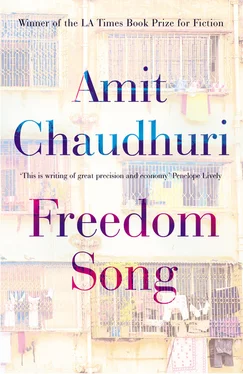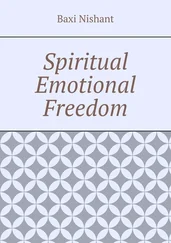There was an old bicycle shop across the road, with mournful floppy tyres hanging like festoons at the entrance. Further on, the road bifurcated, and at that point there was a triangular island of green barricaded by iron railings, some of them missing, in which there was a bust of Swami Vivekananda, painted white. What eyes Vivekananda had — eyes of deep unwavering calm which remained untroubled by the insistent hooting of the state transport buses going past. The grass that grew around the bust had become coarse and dry, and seemed more so in the winter. Cows, spent, unworldly, idol-like, sometimes reclined before that statue. Girls and boys knelt enquiringly on the pavement, searching endlessly for souvenirs, emitting urgent cries in the dusk, snot dried around their noses. At five o’clock in January it would become dark, and the small lights glowing in windows would serve as a human counterpoint to the sunlight that scattered and spread at the turning of the road. In the tea-shop, shawls would cover the tops of the timid and cold-fearing Narayan’s and Narayan’s uncle’s heads, two Bihari expatriates, while tea continued to brew and swirl in the blackened kettle. But now it was bright, and Sumanta Saha, who had finished his bhaad of tea, threw it on the pavement and crushed it underfoot like an egg-shell.
‘Bhaskar!’ he called to the one who was still unsmilingly smoking. ‘Are we meeting on Friday, then?’
Bhaskar was in a dark recalcitrant mood, possessed by the kind of lethargy that people usually succumb to in the summer, or just before the monsoons, in June. He lifted his large black long-lashed eyes.
‘Hu.’
‘Have you xeroxed the script for the play?’ asked the large Sumanta in his thin childlike voice.
He was speaking of the street-play they were to perform in Behala, an allegorical tale about life in capitalist Russia, called The Fall of Ashoka, written by the talented young man whose mind engendered almost all their plays, Arjun Dastidar.
‘Yes,’ said Bhaskar, opening his mouth a little.
‘Then I’ll see you on Friday,’ said the big man, reassured. ‘I’m going home now — you know why. I forgot to bring money with me — just pay my twenty-five paisa to Narayan, Bhaskar, I’ll give it to you on Friday.’
‘There’s no need,’ said Bhaskar.
That night, after Haridasi, wordlessly and systematically, had beaten the mattresses with a jhata, and laid out the soft damp white quilts on the bed, and lit the Tortoise mosquito coils in the rooms, while Bhaskar and Piyu watched the English film on television downstairs, Bhaskar’s father turned the knobs for the medium and short wave on the radio — to listen to who knows what — producing a curious but characteristic mélange of noises, strange haunting voices that would be interrupted by fading frequencies, desperate snatches of the Oriya and Assamese news, the spiritual monotonous faraway sound of a raag being sung, then being swallowed up by a whistling, humming vacuum, strains of Greek music, the nasal lisping of Arab voices: it was after eleven, and India seemed to come alive on the air-waves in ghostly manifestations, and beyond it, the world. And it was an old habit of his, going back to the first months of his marriage, to stand thus at this hour turning the knobs, allowing his soul to plunge into the vast uncharted territory that the radio so mysteriously tuned into at night. He had missed the news on television, and the English, Bengali, and Hindi news on the radio; now he was hoping that some mysterious nocturnal station would tell him what the new Indian cricket team was. ‘Foolish to have left Gower out,’ he told himself.
‘We should go somewhere on a trip,’ said Bhaskar’s mother slowly, lying on the bed. ‘Maybe Darjeeling.’
‘At this time of the year?’ said her husband. ‘No! Do you know how cold it will be there now?’
‘Somewhere, then. Somewhere in the South.’
She lay there, thinking. She went on pilgrimages with her sister or with Piyu to Gopalpur, or to Nabadweep where Chaitanya had preached; they all went for picnics in the winter with oranges and flasks of tea to Diamond Harbour or Digha; and, once, over the last three years, with Mohit and Puti and others they had taken a plane — a great event — to Kathmandu, and once to the hills of Kalimpong. They had gone during the Pujas, in September, when it was hot and humid and the insects named after the goddess herself — Shyama — sought out the light bulbs and lay dead on the floor in the morning. It gave them great pleasure, in that heat, to pack up jackets and cardigans and caps, and return a week later with photographs in colour with themselves — recognizably themselves, but subtly changed as if by a magic spell — standing against a blue and green back-drop of hills, embarrassed or jubilant smiles on their faces, Bhaskar slouching, Piyu sullen and self-conscious, Puti glorious and histrionic, and a little frown always, always residing between Bhaskar’s father’s eyebrows, all of them having donned those woollen caps and cardigans. There, among those misty hills, waking to early sunrises, they made friends with other Bengalis like themselves, who too were visiting from Calcutta, and whose names they forgot once they had returned to the city. Perhaps Bhaskar’s mother loved these excursions more than anyone else. For three-quarters of her life, she had never been able to leave this house and go anywhere, except for those brief pilgrimages to Gopalpur and Nabadweep. But now she wanted to go to Haridwar and Kashi on the banks of the Ganga, to the long swinging bridge in Lakshmanjhula, all the sacred places she had heard of, hidden in mountains or in repose by rivers; she wanted to go south to Kerala, and to Cochin, and Kovalam, and Kanyakumari, the tip of India. Perhaps even to Manik, across the seas. . She had a black spot on the sole of her right foot — she had had it since childhood — which meant that she would travel widely. She had always treated it as a kind of joke, but lately, without her realizing it, it seemed to have released its powers, and her feet were planting themselves on strange grounds she had never thought of visiting.
Her husband loved this city. He loved its fish, rui and katla and koi with black oily scales, and during the monsoons he would cry out a truism that he repeated with great ardour at this time every year: ‘Ilish is the king of fishes!’ He was a tense man, it was difficult to discuss anything with him without getting into a serious argument — all his life he had been like that. But take him out of Calcutta, and one could imagine him becoming unhappy and quiet. Thirty years ago, he had come to this city and got married. Since then, its air had changed, till now a nimbus of smoke and dust and fumes surrounded it always. But he loved it as one who had come here and made his life here. Here he had launched his small business, here he had had his children, Bhaskar, Manik, and Piyu; they had gone to the same school and read Bengali and English and read the same subjects, and in them, in the way they spoke and in what they spoke of, he saw Calcutta more truly than in himself; they were the children of this city. As they grew up, from dark helpless bundles to two thin boys who loved cricket and feared insects, and a tongue-tied girl who made orange squash by herself with a spoon and a tumbler, to the three different beings they were now, he seemed to have seen them changing as rapidly and miraculously as if he had been witnessing a plant growing over a month, and as they grew a sense of loss came to him, a sense of distance from the Bhaskar and Piyu and Manik that twenty years ago he had dreamed vividly they would be, though he was not sure what the dream was. But three children had become ghosts as three children had grown up, and only he, it seemed, had remained the same. Who was he? Time and Calcutta seemed to pass through him like water. He had come here and fallen in love with Gariahat, its fish and vegetable market with its shouting community of vendors and darting basket-boys. That was Calcutta. Then, in 1971, not far away, Bangladesh was created, and the refugees who had come to the city set up their small stalls in Gariahat. It was his life; no one else would know it.
Читать дальше












